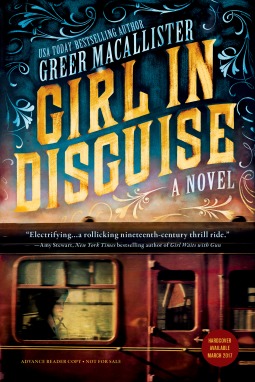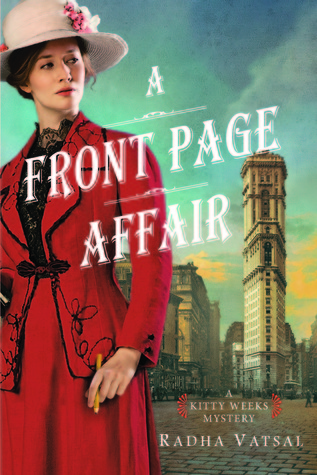 Girl in Disguise by Greer Macallister
Girl in Disguise by Greer Macallister Formats available: hardcover, ebook, audiobook
Pages: 308
Published by Sourcebooks Landmark on March 21st 2017
Purchasing Info: Author's Website, Publisher's Website, Amazon, Barnes & Noble, Bookshop.org
Goodreads
For the first female Pinkerton detective, respect is hard to come by. Danger, however, is not.
In the tumultuous years of the Civil War, the streets of Chicago offer a woman mostly danger and ruin-unless that woman is Kate Warne, the first female Pinkerton detective and a desperate widow with a knack for manipulation.
Descending into undercover operations, Kate is able to infiltrate the seedy side of the city in ways her fellow detectives can't. She's a seductress, an exotic foreign medium, or a rich train passenger, all depending on the day and the robber, thief, or murderer she's been assigned to nab.
Inspired by the real story of Kate Warne, this spirited novel follows the detective's rise during one of the nation's greatest times of crisis, bringing to life a fiercely independent woman whose forgotten triumphs helped sway the fate of the country.
My Review:
The subject of this fictionalized biography would be downright offended at its title. By the time this book begins in the mid-1850s, Kate is a woman whose illusions seem to have been stripped away long ago. She’s also a widow.
“Girl” doesn’t fit her at all, and she wouldn’t want it to. What she wants, at least as she is portrayed in this book, is to be treated as an equal. The equal of any man in the Pinkerton Agency. And it’s a hard-knock fight every single step of the way.
Kate Warne was a real person. Admittedly, a real person about whom not very much at all is known. Which makes her a great character on which to hang a work of historical fiction. Particularly since what is known about Kate Warne is the stuff of fiction to begin with.
Kate was the first female Pinkerton agent. Hired in 1856, she was one of the first, if not the first, female detectives in the world. No one expected her to succeed. No one even expected her to apply. There was no such thing as female detectives or female police officers when Kate Warne answered Allan Pinkerton’s “Help Wanted” advertisement for new agents.
But as she says, “Someone has to be first.”
Her life, what little we know of it, is the stuff of legends. Most of the information about her real career was kept in the Pinkerton office in Chicago. And most of it was wiped out in the Great Chicago Fire. (Mrs. O’Leary’s cow has a LOT to answer for)
One of the things that is known, and that made her fame, was her part in spiriting then-President-Elect Abraham Lincoln through a risky Baltimore night ride on his way to his inauguration – and his subsequent date with history. Without Warne, the history of the U.S. as we know it might have been far different.
But this book is a fictionalized version of her life, stitching together what little is known about her, with considerably more that it known about the Pinkerton’s in general and their work during the Civil War in particular, and making a fascinating story out of it, without descending into rank sensationalism or outright melodrama, at least until the very end.
Kate Warne lived a brief but fascinating life. I wish history had left us more details of her adventures. But if they were even half as hair-raising as this story, her candle must have burned very bright indeed.
Escape Rating B: I left myself plenty of time to read this one, because while I was very interested in the subject, I was a bit unsure about the author. As much as so many people loved The Magician’s Lie, when I gave it a try I couldn’t get into it at all. But Girl in Disguise grabbed me from the first page.
I think that had to do with Kate’s voice. The book is written in first-person singular, so throughout the story we are always in Kate’s head. It’s a fascinating place to be. While the circumstances of Kate’s life are particular to her time and place, so many of her thoughts seem universal to working women.
She wants to be considered as a professional, on an equal basis to the men in the agency. She never trades on her feminine wiles, and has nothing but professional relationships with all of the male Pinkerton’s, particularly including Allan Pinkerton himself. As portrayed in the book, the relationship between them was strictly professional from beginning to end. He mentored her and trusted her in a way that would have raised no eyebrows if she had been a man, but because she was a woman she constantly battled rumors that they were having an affair – rumors that persist to the present day in spite of a complete lack of evidence either then or now. It was simply assumed that a woman could not possibly be hired or trusted on her own merits.
Until the end, Kate is in love with her job, and as so many of us do, sacrifices most of her life to the pursuit of her work. But Kate isn’t the only one. As one of the male agents comments, none of them have personal lives, with the exception of Pinkerton himself. They are on the road too much, and they must keep way too many secrets. No spouse, male or female, is willing to tolerate that kind of treatment for very long.
What made Kate so relatable, at least for this reader, is just how dispassionate she is about her own life. She’s not given to flights of either hyperbole or fancy, at least in the privacy of her own head. This is who she is, this is what she does, this is what it costs her. She’s a heroine, but she never sees herself that way. She’s a woman doing a job that challenges her in ways that she can’t find anyplace else, and that she absolutely loves. She’s doing what she was born to.
There is historic evidence that Kate was part of the team that kept Lincoln alive on his way to his inauguration. Many of the other cases in the book where she is involved are based on real Pinkerton cases, even if Kate’s specific involvement is not known, and a few have been combined for dramatic license.
I really enjoyed the perspective of Kate the professional woman, both her triumphs and her many and frequent qualms about whether the ends justified the means. She has a lot to live with, and sometimes, quite reasonably so, she has second, third and fourth thoughts.
As a reader, I wish that her dispassion had not failed her in the last quarter of the book. I very much enjoyed reading about Kate in love with her work, and the details of that work as the Civil War heated up. I was less enthralled when Kate fell in love with a fellow agent. At that point the melodrama swept in.
But all in all, Girl in Disguise is a fascinating portrait of an unsung heroine – Kate Warne, the first female “private eye”.
~~~~~~ TOURWIDE GIVEAWAY ~~~~~~
Greer and Sourcebooks are giving away 3 copies of both The Magician’s Lie AND Girl in Disguise to lucky participants in this tour.
a Rafflecopter giveaway

 A Front Page Affair (Kitty Weeks Mystery, #1) by
A Front Page Affair (Kitty Weeks Mystery, #1) by